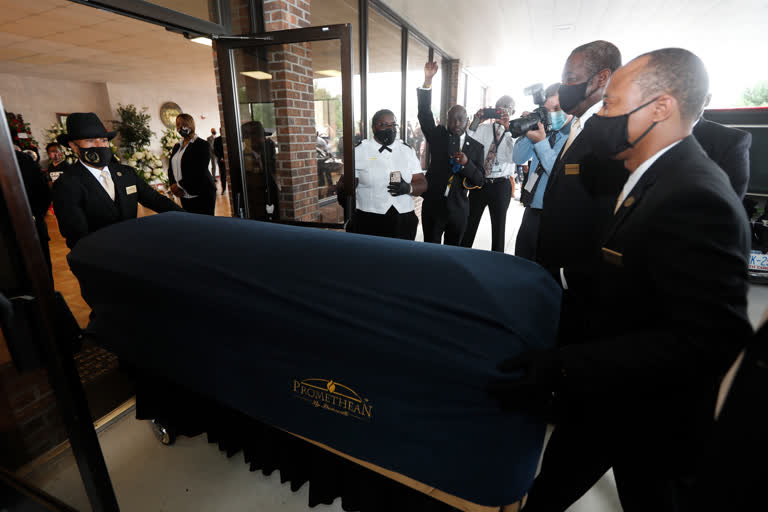Raeford: Hundreds of mourners lined up Saturday to pay respects to George Floyd in his North Carolina hometown, and the nation's capital prepared for what was expected to be the city's largest demonstration yet against police brutality.
Military vehicles and officers in fatigues closed off much of downtown Washington to traffic ahead of the planned march, which was expected to attract up to 2,00,000 people outraged by Floyd's death 12 days ago at the hands of police in Minneapolis.
Read also:'Black Lives Matter' protests mostly peaceful in Australia
Large protests also took place across the US and in major cities overseas, including London, Paris, Berlin and Sydney, Australia.
In Raeford, the small town near Fayetteville where Floyd was born 46 years ago, a long line of people formed outside a church, waiting to enter in small groups for a chance to look at his coffin. A private service was scheduled for later in the day.
The line of people waiting to view the coffin included families with young children and teenagers. One young woman wore a green and gold graduation cap and gown as she walked beside her parents. Most people wore surgical masks or cloth face coverings.
Read also:Surfers 'paddle out', circle up in memory of George Floyd
When a hearse bearing Floyd's coffin arrived, chants of "Black Power," "George Floyd" and "No justice, no peace," echoed from beneath the covered entrance.
"It could have been me. It could have been my brother, my father, any of my friends who are black," said a man in the crowd, Erik Carlos of Fayetteville. "It was a heavy hit, especially knowing that George Floyd was born near my hometown. It made me feel very vulnerable at first."
Washington has seen daily protests for the past week — largely peaceful, with people marching back and forth from the White House to the Capitol and the Lincoln Memorial. Army Secretary Ryan McCarthy said local officials expected 100,000 to 200,000 protesters for Saturday's event. The White House has been fortified with new fencing and extra security precautions.
In general, demonstrations in the U.S. have shifted to a calmer tenor in recent days after frequent episodes of violence in the early stages. Protesters and their supporters in public office say they are determined to turn the extraordinary outpouring of anger and grief into change, notably in regard to policing policies.
In Minneapolis, city officials have agreed to ban chokeholds and neck restraints by police and to require officers to try to stop any other officers they see using improper force. In California, Gov. Gavin Newsom ordered the state's police training program to stop teaching officers how to use a neck hold that blocks the flow of blood to the brain.
